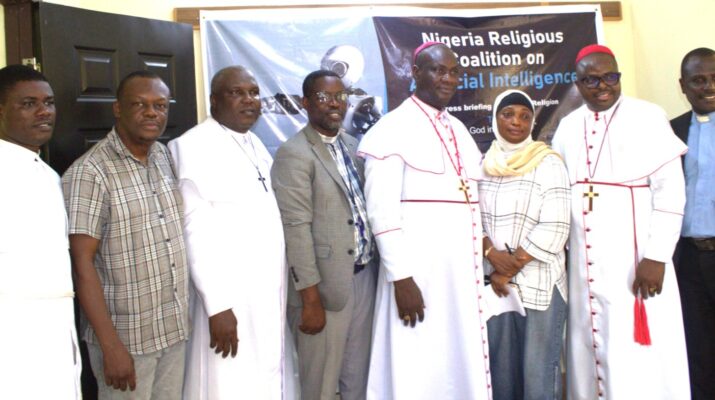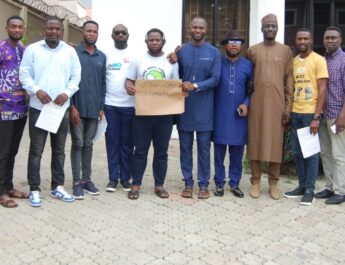With all the advantages and quick fix tendencies of Artificial Intelligence (AI) spreading like wild fire around the world, its promoters and users have been urged to tread with caution because just like its many benefits, it also possesses the capacity to inflict unimaginable harm on humanity
By Edu Abade
Artificial Intelligence (AI), the new buzzword in technological circles is gaining more traction by the day due to its expanding influence in global economy and businesses including agriculture, education, health trade, telecommunications, maritime, financial services and even religion, among others.
Although AI has been widely celebrated globally as the liberator of mankind from using manual labour in achieving certain goals, as it is believed to perform tasks better and faster than humans, it also comes with some defects such as lack of conscience, emotion, empathy and even a soul.
The deployment of AI to perform almost all human functions, means that once fed with human intelligence, data or information, the machine can carry out even sinister assignments on targeted individuals and institutions, with unimaginable consequences for personhood and humanity.
This was the verdict of clerics who gathered on Tuesday, April 8, 2025 at Renevlyn Development Initiative (RDI) Office in Lagos to review the role, advantages and threats of AI at a media briefing with the theme: God in the Engine: Religion and Artificial Intelligence in Nigeria, during which they maintained that with all its benefits, AI has the capacity to make, maim or mar, all things considered.
Speaking at the briefing organized by the Nigeria Religious Coalition on Artificial intelligence (Christian Council of Nigeria, Institute of Church and Society Ibadan (CCN-ICS) and Jama’atu Nasril Islam (JNI) and supported by the Future of Life Institute (FLI), Bishop, Diocese of Lagos West, Methodist Church, Nigeria, Right Reverend Ezekiel Oluyinka Akande, insisted that AI remains both an asset and a threat to humanity.
Insisting that God still reigns supreme in the affairs of men in that He is the maker of human beings and all the intelligence and discretion they possess, he said: (AI) has the power to make the world move fast and proffer solutions to specific issues in today’s society.
“Also, it is no longer news that AI has come to stay in today’s world. But we will be lying to ourselves if we think that technological development does not have effect on humanity or have the tendency to make men think and act like they are god, even when such acts affect their fellow humans.
“Consequently, it is important for religious communities to have conversations on the need to create a balance between the technological world and the religious world so that what is meant to give relief will not create a more deadly problem for humanity. This is a conversation that religious communities cannot shy away from.”
He explained that due to the relationship between humanity and AI, the United States (US) and China are seeing rapid breakthroughs at the frontier of what artificial intelligence is capable of doing and are now in the corporate race to create Artificial General Intelligence (AGI), which will be able to do every human task better than humans.
Bishop Akande, who spoke in company of the General Secretary of CCN, Right Reverend Evans Onyemara; Director of CCN-ICS, Very Reverend Kolade Fadahunsi and a representative of JNI, pointed out that with all current the buzz around AI, the researchers do not know how to control the systems they are producing.
“The systems act increasingly deceptively and unpredictably. Yet such systems are being put in charge of companies, military applications and important decision-making with real-world impacts. There is no plan for how to prevent the sudden disasters or gradual disempowerment risked by these developments.
He further stressed that AI is pervasive in that it is embedded in personal assistants, which helping human beings to manage their routines and answer questions and that it is powering the code that translates social media posts into natural languages so anyone, regardless of their language preference, that could be understood and shared.
It is part of the algorithm that allows e-commerce platforms to suggest products and discounts, just as it manages healthcare and fitness, as well as navigates spacecraft, ocean vessels, trains, buses, trucks and cars.
“As technologists, politicians, scientists and business people push the limits of AI, religious groups, philosophers and academics also debate how far AI should go-and what should happen as it becomes part of the fabric of our lives. As a result, it raises several spiritual and moral questions about identity, the self, and what it means to be human.
“These questions impact the way we approach work, family and our faith. It can result in fear of “strong AI,” or what AI could someday become: human intelligence replicated inside machines.
“Strong AI is also known as Artificial General Intelligence (AGI). So far, not yet achieved, but upon its arrival, will require a total rethinking of the qualities we associate with the human experience: consciousness, purpose, intelligence, the soul and in short, personhood. When a machine possesses the ability to think like a human or make its decisions autonomously, should that machine be considered a person?
“Religious communities may have the most significant stake in the conversation about AGI and personhood. One of the worst possible outcomes for A.I. is that of polarizing two worlds: the technological world and the religious world.
“There has been a significant lack of meaningful discourse between the two communities. This lack of dialogue has been discouraging and prevents religion from contributing a necessary perspective to technological development.
“If we do not include belief in the development of new technologies, we miss the opportunity to augment human life and benefit religion. If we somehow diminished personhood by creating artificial intelligence, that’s a bad thing. But, if we can create artificial intelligence that allows people to live life more fully, it could bring people closer to God,” the cleric stated.
Bishop Akande equally pointed out that another concern is creating a machine with strong AI that becomes an outlet for worship, adding: “It would be idolatrous to utilize strong AI as a method to defeat death and redefine the human race. These are challenging, explosive ideas scientists and futurists don’t like to embrace.
“Christian and Islamic doctrines teach that placing one’s trust in anything other than God, the creator is idolatry. That moves way beyond the realm of mirroring God’s creativity. Fundamentally, a stand-in for God will be created in our image if we find in A.I. that with whom we can share our being and our responsibilities.
“How will we respond? Conscripting machines to do our bidding, transferring knowledge to them, with their exponential capacity for storage and processing, could result in the devices becoming far more intelligent than humans. Then, one day, the machines may decide to dominate us.”
He said right now, communities should prepare for the eventual creation of a machine with strong A.I. by thinking about how the technology reflects their values. How can we employ technology to advance the principles of God? By imbuing technology with values that stem from emulating God.
“AI will change rapidly, but religious and scientific communities have tools to explore both the ethical and moral limits. Key to this is working on ourselves, to shape the technology we have right now, he added.
On his part, Right Reverend Onyemara, submitted that although the coalition does not have all the answers to the prospects and challenges of AI in an ever evolving technological space, the initiators of the vision will do everything in their powers to expand membership of the Christian community to ensure that it becomes a movement with a view to salvaging a vicarious humanity from the threats and negative influences of AI.
On the need to apply wisdom in the application and deployment of AI to all human endeavours, the clerics maintained that the most powerful AI systems are being made without regard for the deeper religious questions at play. Greed for power and wealth are at the centre of these endeavours, not God.
“About 84 percent of the world believes in traditional religion; they are not represented in the AI race. AI companies aim to change what it means to be human and create their own false gods. AI’s impacts on democracy, jobs and human relationships will be profoundly disruptive for society and without religious leadership guiding communities through these changes we risk widespread, unprecedented chaos,” they stressed.
On Nigeria’s religious context, they argued that the central importance of Islam and Christianity in all aspects of Nigerian life places Nigerian religious leaders in a position of immense responsibility, but that they are well-equipped to answer the needs of their communities, given their rich philosophical, ethical and charitable traditions.
They urged the Federal Government to push for the establishment of international governance frameworks to safeguard against the global risks of world-leading AI developments, adding that the Future of Life Institute (FLI) recommends hard limits on computational power, enhanced liability frameworks and comprehensive safety standards.
“Nigeria is in a strong position to harness the numerous benefits offered by controllable AI tools: in agriculture, education, healthcare and more. Domestic governance must ensure AI is built and used safely and ethically in line with Nigeria’s religious values, traditions and communities that people are protected from AI manipulation, while workers rights and livelihoods should be respected and prioritized,” the coalition added.
The Nigerian Religious Coalition demanded greater religious engagement on questions around AI in harnessing AI tools for progress in agriculture, health and education, as well as prohibit uncontrollable Artificial General Intelligence that will disempower human workers, undermine human relationships or decrease human agency.
“We should guard against AI becoming an idol or leading believers astray through manipulation. Specifically on religious applications: religious groups should be proactive to learn about but cautious to apply AI systems.
“Rashly employed, AI could dehumanize religious practices or be subverted by malicious actors into misleading congregations contrary to their doctrine. Yet careful discernment may yield useful practical applications, such as in speeding up administrative tasks,” the coalition concluded.




